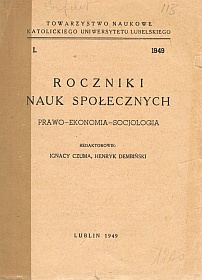The science of law and its axiomatisation
Abstract
The method of the deductive system, called axiomatical, is the deepened deductive method; it consists in making evident the premises (primitive terms) accepted without proof, in precise definitions of expressions newly brought into use, and in defining rules of inference. If every science is a collection of propositions put in order, then the axiomatical method is an excellent way of putting them in order. The question arises whether this method found out by logicians, applied to mathematics, geometry, physisc and other sciences can also be applied to legal science. If we accept that science is a methodic, sure and systematic cognition of general matters by their causes and that law is the rule of human action which is enjoined by reason; published and promulgated by the one who has the care of a given community in order to attain its general welfare, we shall have to agree that legal science is just that kind of cognition of the thus defined phenomenon called law. Legal science is divided into: sciences in the strict sense and philosophy of law, according to whether it seeks the near reasons or the final reason of law. In Legal science Sensu stricto we can discern such disciplines as: the psychology of law, the sociology of law, the policy of law, the history of law and the dogmatics of law. A deeper analysis of these law disciplines points to the fact that in the state of their actual development the axiomaical method can be efficiently applied to the philosophy of law and partly to the dogmatics of law. Both these sciences have, in certain regards, the character of deductive sciences. Moreover the history of philosophy of law seems to be one great unconcious effort, tending to establish primitive terms, axioms and legal definitions. It seems that nobody has as yet endeavoured to establish rules of inference accepted in this discipline. Taking up a full and conscious attempt of axiomatisation e. g. of St. Thomas doctrine of natural law, a higher degree of scientific strictness could thus be attained; discussions with opponents, limited to the principles of the system, would also be easier.
Copyright (c) 1949 Roczniki Nauk Społecznych

This work is licensed under a Creative Commons Attribution-NonCommercial-NoDerivatives 4.0 International License.


